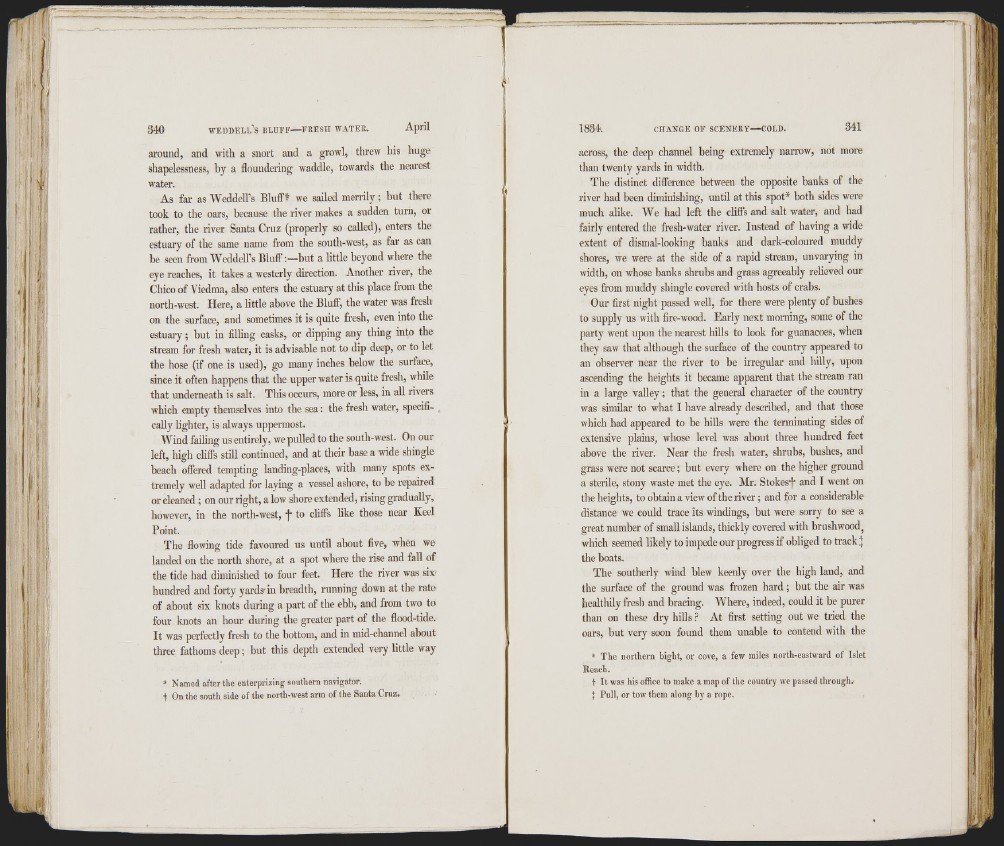
Mi
i III
, 1 il .1 it
ll |.
í-r
340 WEÜDELL’s b l u f f FKESH WATEK. April
around, and with a snort and a growl, threw his huge
shapelessness, by a floundering waddle, towards the nearest
water.
As far as Weddell’s Bluffs we sailed merrily ; but there
took to the oai-s, because the river makes a sudden turn, or
rather, the river Santa Cruz (properly so called), enters the
estuary of the same name from the south-west, as far as can
be seen from Weddell’s Bluff;—hut a little beyond where the
eye reaches, it takes a westerly direction. Another river, the
Chico of Viedma, also enters the estuary at this place from the
north-west. Here, a little above the Bluff, the water was fresh
on the surface, and sometimes it is quite fresh, even into the
estuary; but in filling casks, or dipping any thing into the
stream for fresh water, it is advisable not to dip deep, or to let
the hose (if one is used), go many inches below the surface,
since it often happens that the upper water is quite fresh, while
that underneath is salt. This occurs, more or less, in all rivers
which empty themselves into the sea; the fresh water, specifi- ,
cally lighter, is always uppermost.
Wind failing us entirely, we pulled to the south-west. On our
left, high cliffs still continued, and at their base a wide shingle
beach offered tempting landing-places, with many spots extremely
well adapted for laying a vessel ashore, to be repaired
or cleaned ; on our right, a low shore extended, rising gradually,
however, in the north-west, ! to cliffs like those near Keel
Point.
The flowing tide favoured us until about five, when we
landed on the north shore, at a spot where the rise and fall of
the tide had diminished to four feet. Here the river was six
hundred and forty yards-in breadth, running down at the rate
of about six knots during a part of the ebb, and from two to
four knots an hour during the greater part of the flood-tide.
I t was perfectly fresh to the bottom, and in mid-channel about
three fathoms deep; but this depth extended very little way
• Named after the enterprizing southern navigator.
t On the south side of the north-west arm of the Santa Cruz.
CHANGE OF SCENERY COLD.
across, the deep channel being extremely narrow, not more
than twenty yards in width.
The distinct difference between the opposite banks of the
river had been diminishing, until at this spot* both sides were
much alike. We had left the cliffs and salt water, and had
fairly entered the fresh-water river. Instead of having a wide
extent of dismal-looking banks and dark-coloured muddy
shores, we were at the side of a rapid stream, unvarying in
width, on whose banks shrubs and grass agreeably relieved our
eyes from muddy shingle covered with hosts of crabs.
Our first night passed well, for there were plenty of bushes
to supply us with fire-wood. Early next morning, some of the
party went upon the nearest hills to look for guanacoes, when
they saw that although the surface of the country appeared to
an observer near the river to be irregular and hilly, upon
ascending the heights it became apparent that the stream ran
in a large vaUey; that the general character of the country
was similar to what I have abeady described, and that those
which had appeared to be hills were the terminating sides of
extensive plains, whose level was about three hundred feet
above the river. Near the fresh water, shrubs, bushes, and
grass were not scarce; but every where on the higher ground
a sterile, stony waste met the eye. Mr. Stokes-f- and I went on
the heights, to obtain a view of the river; and for a considerable
distance we could trace its windings, but were sorry to see a
great number of small islands, thickly covered with brushwood^
which seemed likely to impede our progress if obliged to track]
the boats.
The southerly wind blew keenly over the high land, and
the surface of the ground was frozen hard ; but the air was
healthily fresh and bracing. Where, indeed, could it be purer
than on these dry hills ? At first setting out we tried the
oars, but very soon found them unable to contend with the
* The northern bight, or cove, a few miles north-eastward of Islet
Beach.
+ It was his office to make a map of the country we passed through.
Í Pull, or tow them along hy a rope.